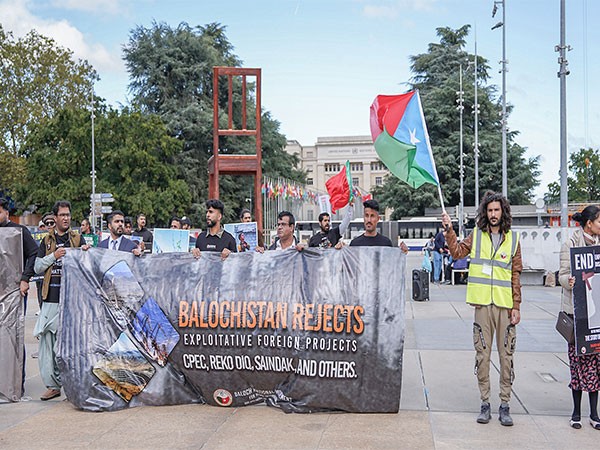Enforced disappearances continue to shame Pakistan as Baloch National Movement highlights latest incident at UNHRC

Enforced disappearances remain a critical human rights issue in Pakistan, casting a long shadow over the country’s political landscape and social fabric
At the UN’s 57th Human Rights Council’s (UNHRC) general debate this week, Baloch voices were loud flagging the enforced disappearances and extrajudicial killings.
Some of the latest incidents were highlighted by Baloch National Movement (BNM) at UNHRC.
These disappearances, defined by the United Nations (UN) as the arrest, detention, or abduction of individuals by state agents or other parties acting with the state’s authorization, followed by a refusal to acknowledge the person’s fate or whereabouts, are both a grave violation of human rights and a profound personal tragedy for victims and their families.
The phenomenon of enforced disappearances in Pakistan is deeply intertwined with the country’s political and security landscape.
It gained prominence in the early 2000s, largely tied to Pakistan’s role in the United States-led War on Terror.
Thousands of individuals, mainly suspected militants or those with ties to extremist groups, were allegedly detained by security forces without trial or due process.
Over time, the scope of disappearances broadened to include political activists, journalists, students, and members of ethnic and religious minority groups, especially from conflict-ridden regions such as Balochistan, Khyber Pakhtunkhwa, and Sindh.
The Balochistan province, in particular, has been the epicenter of enforced disappearances, where the ongoing Baloch nationalist insurgency has led to allegations of widespread state repression.
Human rights organizations claim that hundreds, if not thousands, of Baloch activists, students, and intellectuals have gone missing, many of whom are believed to have been abducted by security agencies.
Similar patterns have emerged in Sindh, where Sindhi nationalist groups have accused the state of targeting political activists through enforced disappearances.
This week, Niaz Baloch, Deputy Coordinator of the Baloch National Movement’s (BNM) Foreign Department and Central Committee member, addressed the UN 57th Human Rights Council’s (UNHRC) general debate, focusing on the dire human rights situation in Balochistan, particularly the alarming rate of enforced disappearances and extrajudicial killings.
During his intervention, Niaz Baloch drew attention to the recent abduction of Ustad Wahid Kamber, a revered Baloch leader, by Pakistani forces in Kerman, Iran.
He implored the council for immediate action toward the safe recovery of Baloch missing persons, including Ustad Wahid Kamber.
Niaz Baloch presented distressing statistics from Paank, a human rights organization, highlighting that in May 2024 alone, 90 individuals were reported forcibly missing, marking the highest monthly count that year.
This trend, he noted, averages about 44 disappearances monthly.
Furthermore, August 2024 witnessed 14 extrajudicial killings, averaging five such incidents per month, often disguised under the pretext of counter-terrorism operations.
The issue extends beyond Balochistan’s borders, with abductions of Baloch activists occurring in neighbouring countries.
On July 19, Wahid Buksh, known as Ustad Wahid Kamber Baloch, a 74-year-old senior leader, was abducted.
This incident, likely politically motivated, has raised international alarms, especially considering his age and deteriorating health.
Niaz Baloch urged the Human Rights Council to hold Pakistan accountable for these atrocities and to push for the immediate release of those detained under these circumstances.
“Mr. President, today I urge this council to address the increasing human rights abuses in Balochistan and demand the release of the missing, including Wahid Kamber,” he said during his speech, calling for global attention and intervention to stop the cycle of violence and human rights violations in the region.
According to researchers working on the phenomenon in Pakistan, enforced disappearances violate a host of fundamental human rights, including the right to life, liberty, security, and the right to not be subjected to torture or cruel treatment.
Despite these violations, victims and their families face tremendous challenges in seeking justice, they said.
Pakistan’s legal system offers limited recourse, as many victims are held in secret detention centers, outside the reach of the courts.
The practice is often cloaked in national security concerns, making it difficult to hold perpetrators accountable.
Families of the disappeared, many of whom have been fighting for years to locate their loved ones, often find themselves stonewalled by state institutions.
The police and other authorities frequently refuse to register cases of disappearances, leaving families with no legal pathway to trace their relatives.
Those who dare to speak out against the disappearances, including activists and human rights defenders, often face harassment, intimidation, and threats.
The role of Pakistan’s security agencies, particularly the military and intelligence services, is frequently highlighted in cases of enforced disappearances.
Human rights organizations, both local and international, have accused these agencies of detaining individuals without charges and holding them in secret detention centers.
While the state has occasionally acknowledged the problem of missing persons, progress on addressing the issue has been slow and inadequate.
The Supreme Court of Pakistan has intervened in several cases, and the government has established the Commission of Inquiry on Enforced Disappearances (COIED) to investigate complaints.
However, the commission has been criticized for its inefficacy and lack of transparency, with many cases remaining unresolved.
According to human rights groups, the number of enforced disappearances continues to rise, despite the commission’s existence.
International human rights organizations, such as Amnesty International and Human Rights Watch (HRW), have frequently condemned the practice of enforced disappearances in Pakistan.
In 2021, the UN Working Group on Enforced or Involuntary Disappearances expressed concern over the increasing number of disappearances in Pakistan, urging the government to take concrete steps to address the issue.
The UN has repeatedly called on Pakistan to sign and ratify the International Convention for the Protection of All Persons from Enforced Disappearance. Despite these calls, Pakistan has yet to ratify the treaty, which would impose a legal obligation on the state to prevent enforced disappearances and bring those responsible to justice.






